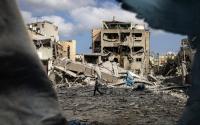February 9 2011
by Pepe Escobar
The Egyptian revolution is being dissolved right in front of the world's eyes by an optical illusion.
The protesters who have been on the streets for two weeks still want President Hosni Mubarak out. Now. Yet United States President Barack Obama is firmly in not-so-fast mode, glad that "Egypt is making progress". Obama has not mentioned even once the capital words "free elections".
Washington's "orderly transition" road map - fully supported by Tel Aviv and European capitals - is a facelift. Mubarak stepping down has become an afterthought; the already anointed successor is Vice President Omar Suleiman, the former head of the Mukhabarat, whom the protesters call "Sheik al-Torture".
Sheik al-Torture already behaves as a president - while the actual president is still inhabiting his palace, but as a ghost. The regime, a brutal military dictatorship, remains an immovable subject - even while being denounced by the protesters as illegitimate from A to Z, from the executive to the legislative. The key point is that acting president Suleiman is the regime. If French philosopher Jean Baudrillard was alive, he would say this revolution never took place - except on the world's television screens.
Some among the fragmented opposition want the head of the constitutional court to be appointed as interim president, and then preside over the election of a constituent assembly. Others - including the youth movement - want a national committee to supervise the Washington-sanctioned "orderly transition".
Gilbert Achcar, professor of international relations at the School of Oriental and African Studies in London, goes straight to the point, "In order to impose such a thorough change, the mass movement would need to break or destabilize the regime's backbone, that is, the Egyptian army."
Meet the new boss ...
Egypt is a hardcore military dictatorship. The army, essentially paid for by US taxpayer money, is no "honest broker". The Mubarak regime's repression against the protests has not been even more vicious because soldiers in this conscript army would certainly have refused to shoot their own people; thus plan B, the regime's goons and the hated baltagia - state-sponsored thugs in plainclothes - unleashed last week.
Still, the regime was never shaken to the core - because the army remains in charge. Graphic example; the state-owned newspaper al-Gomhuria had a monster headline this Monday reading "New Era" above a photo of Suleiman meeting some of the opposition under a picture of Mubarak.
The protesters insist on the end of the state of emergency - enforced for the past 25 years. The regime says this would depend on "security conditions"; they could keep repeating this ad nauseam for months. The regime won't accept dissolving parliament; it refuses to hold a really free, fair election to replace the current, kangaroo, pro-Mubarak parliament.
"Divide and rule" is the regime's modus operandi - and it's working wonders. The tactics are predictable; minimal concessions; accusing the protesters of being a tool of "foreign powers"; and also accusing them of being a threat to Egypt's "stability".
Crucial: the "foreign powers" slander came from the lion's (Suleiman's) mouth last Thursday, in a long interview to state television - exactly the same day that foreign journalists were being hunted, beaten, arrested or humiliated all across Cairo. Suleiman explicitly blamed "certain friendly nations who have television channels, they're not friendly at all, who have intensified the youth against the nation and the state". How about that as a democrat's credentials?
Some already see right through it. The left-wing Nasserists (three seats in the 2000 election), who insist the revolution represents all Egyptians, won't talk to Suleiman again unless Mubarak is gone. Suleiman has explicitly said Mubarak - ghost, illusion or both - stays.
Writing on Ahram online, columnist Nabil Shawkat says about Mubarak that "the spirit of his rule, the essence of his regime, and the methods of his era are far from over". He also notes that "in his first television interview, he [Suleiman] gave the impression that he was running the country, that - if he wanted - he could tell Mubarak to go to his room and stay there." Talk about the ghost in the room.
Even with a monster ghost in a closet inside his room, the regime's targets remain clear. Activists, such as independent filmmaker Samir Eshra and blogger Abdel-Karim Nabil Suleiman, keep being arrested. Human Rights Watch's Daniel Williams was kept by the army for no less than 36 hours. It's easy for a well-oiled repression machine to intimidate the overwhelming majority in the streets, who have no political affiliation.
There are no independent workers' unions. The April 6 Youth Movement as well as Kefaya (Enough!) are campaigners, not established political parties. Legendary Egyptian economist Samir Amin, professor at the universities of Paris and Cairo, insists things might change if the working class and peasant movements started to act as forcefully as the current actors - the urban, educated, unemployed youth and the middle classes. What they all should do is to pierce the contradictions of the regime with concerted action.
... same as the old boss
Washington could live with an Egypt like a new Pakistan; a heady mix of unstable comprador elites, some political Islam (via the Muslim Brotherhood), military intelligence and why not, another military dictator. It's not exactly "democracy".
Yet the notion that protesters from all walks of life, from students to lawyers, not to mention Egyptian human-rights groups, would gladly accept the face-lifted Sheik al-Torture as a dialogue-driven democrat speaks Luxor temples about how Washington really despises nationalist, popular movements.
Before the Pharaoh anointed him as vice president last week, Omar Suleiman, aka "Sheik al-Torture" (everyone in Egypt knows he supervised US Central Intelligence Agency (CIA) renditions as well as torture of al-Qaeda suspects), born July 2, 1936, in Qena, southern Egypt, was a minister without portfolio and director of the Egyptian General Intelligence Directorate, the national intelligence agency, from 1993 to 2011.
In the 1980s, he got training at the John F Kennedy Special Warfare School and Center at Fort Bragg in North Carolina. Foreign Policy magazine ranked him the Middle East's most powerful intelligence chief in 2009, even ahead of Israel's Mossad head at the time, Meir Dagan.
It doesn't matter that the Egyptian street abhors him; for the top echelons of the army he is the new rais. Al-Jazeera describes him as "the point man" for Egypt's secret relations with Israel. Israeli Prime Minister Benjamin Netanyahu loves him. Former bouncer and Deputy Prime Minister of Israel Avigdor Lieberman has expressed "his respect and appreciation for Egypt's leading role in the region and his personal respect for Egyptian President Hosni Mubarak and Minister Suleiman".
According to a 2006 diplomatic cable on WikiLeaks, the CIA - what else? - also loves him; "Our intelligence collaboration with Oman Soliman [sic] is now probably the most successful element of the relationship" with Egypt. Suleiman always negotiated directly with top CIA officials.
On the other side of the spectrum, Human Rights Watch stresses, "Egyptians ... see Suleiman as Mubarak II, especially after the lengthy interview he gave to state television Feb 3 in which he accused the demonstrators in Tahrir Square of implementing foreign agendas. He did not even bother to veil his threats of retaliation against protesters." Human Rights Watch notes at least 75 Egyptian activists and demonstrators and about 30 foreign journalists have been arrested since the protests began, and at least 297 people have been killed.
The street is under no illusions. They know the army - the strongest player in the Egyptian political equation - might even invest in a massive crackdown if it feels threatened. The spark could be anything from an imaginary threat from "foreign powers" to a feeling that they will never be ready to cede power to civilians for the first time since 1956.
Minister of Defense Field Marshal Mohammed Hussein Tantawi, for instance, is impervious to "economic and political reforms that he perceives as eroding central government power", according to a WikiLeaks cable. But for the moment the army is more than comfortable with Sheik al-Torture running the show. And so are the democrats in Washington.
Pepe Escobar is the author of Globalistan: How the Globalized World is Dissolving into Liquid War (Nimble Books, 2007) and Red Zone Blues: a snapshot of Baghdad during the surge. His new book, just out, is Obama does Globalistan (Nimble Books, 2009).






